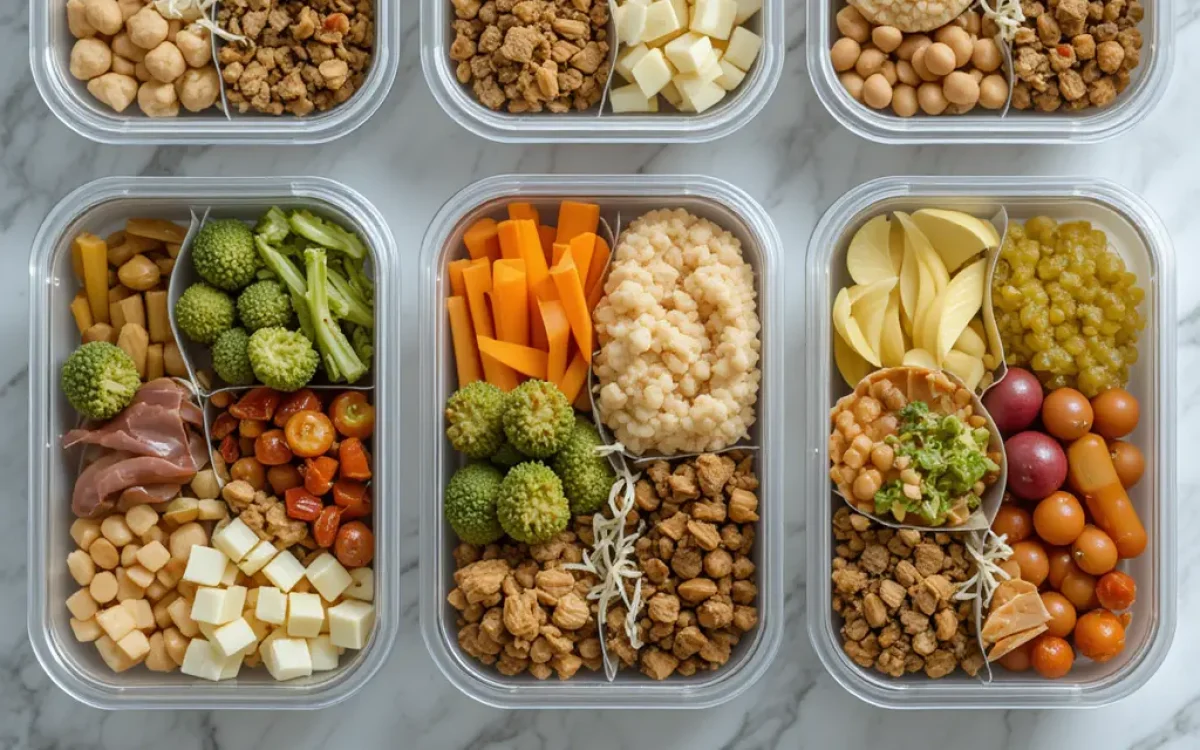Imagine starting each week with a fridge full of delicious, ready-to-eat meals that support your health goals. Meal prepping can transform your routine, saving you time and reducing stress. This article will provide practical tips to help you plan and prepare meals efficiently. Discover how simple changes can lead to a healthier lifestyle and make your week more enjoyable.
Understanding the Basics of Meal Prep
Meal prepping can seem daunting at first, but understanding its basics can transform your weekly routine. Imagine having a fridge stocked with ready-to-eat meals, saving you time and stress. As a nutritionist, I believe that meal prep is a game-changer for maintaining a healthy lifestyle.
What is Meal Prep?
Meal prep involves planning and preparing meals in advance. This could mean cooking a batch of chicken, chopping vegetables, or even portioning out snacks. The goal is to have meals ready to go, reducing the temptation to opt for less healthy options. I remember when I first started meal prepping; it was like having a personal chef. It felt liberating to open the fridge and find everything ready.
Why Start Meal Prepping?
Meal prepping offers numerous benefits. It saves time during busy weekdays and helps control portion sizes, which is crucial for maintaining a balanced diet. For instance, I often prepare quinoa and roasted vegetables on Sundays. This simple act ensures I have nutritious lunches throughout the week. Plus, it reduces food waste, which is a win for both your wallet and the environment.
Incorporating these Meal Prep Tips for a Healthier Week can significantly impact your eating habits. Start small, maybe with just one meal a day, and gradually expand. Remember, the key is consistency. With practice, meal prepping becomes second nature, and you’ll wonder how you ever managed without it.
Essential Tools and Ingredients for Meal Prep
Embarking on a meal prep journey can feel like setting sail on a new adventure. The right tools and ingredients are your compass and map, guiding you toward a healthier week. As a nutritionist, I often find that having the right essentials can make or break your meal prep experience.
Essential Tools for Meal Prep
First, let’s talk about tools. A good set of containers is crucial. Opt for glass or BPA-free plastic to keep your meals fresh and safe. I remember when I first started meal prepping, I underestimated the power of a sharp knife. A quality chef’s knife can save you time and effort, making chopping vegetables a breeze. Another tool I swear by is a slow cooker. It’s like having an extra pair of hands in the kitchen, allowing you to prepare meals while you go about your day.
Key Ingredients for Success
Now, onto ingredients. Stocking your pantry with staples like whole grains, beans, and spices can transform your meal prep routine. I always keep quinoa and brown rice on hand. They are versatile and pair well with almost any protein or vegetable. Fresh produce is another must-have. I love using seasonal vegetables; they add flavor and nutrients to my meals. Don’t forget about proteins. Whether you prefer chicken, tofu, or legumes, having a variety ensures you won’t get bored.
In my experience, the combination of the right tools and ingredients can make meal prep not just a task, but a rewarding part of your week. These Meal Prep Tips for a Healthier Week can help you stay on track and enjoy the process. Remember, the journey to healthier eating is personal, and finding what works for you is key.
Creating a Balanced Meal Plan
Creating a balanced meal plan can feel like piecing together a puzzle. Each meal is a piece that contributes to the bigger picture of your health. As a nutritionist, I often compare it to building a house. You need a strong foundation, which in this case, is a variety of nutrients. Without it, the structure won’t hold.
Understanding Nutrient Balance
When planning meals, aim for a mix of proteins, carbohydrates, and fats. Think of it like assembling a team. Each member has a role, and together, they achieve more. Proteins are the builders, repairing and maintaining tissues. Carbohydrates are the energy providers, fueling your daily activities. Fats, often misunderstood, are essential for absorbing vitamins and protecting organs.
In my experience, people often overlook the importance of fiber. It’s like the unsung hero of nutrition, keeping your digestive system running smoothly. Including fruits, vegetables, and whole grains can make a significant difference. I remember a client who struggled with energy levels. By simply adding more fiber-rich foods, they noticed a remarkable improvement.
Practical Meal Prep Tips
Start by planning your meals for the week. This approach not only saves time but also ensures you stick to your health goals. I suggest using Sundays to prepare ingredients. Chop vegetables, cook grains, and portion proteins. This way, you have a head start on your week. It’s like setting the stage for a successful performance.
Remember, balance doesn’t mean perfection. It’s about making choices that support your well-being. If you slip up, don’t stress. Every meal is a new opportunity to nourish your body. Embrace the journey of creating a healthier routine with these Meal Prep Tips for a Healthier Week.
Time-Saving Strategies for Meal Prep
Meal prepping can feel like a daunting task, especially when you’re juggling a busy schedule. However, with a few strategic approaches, you can transform this chore into a seamless part of your routine. As a nutritionist, I often tell my clients that meal prep is like setting the stage for a successful week. It’s all about finding the right rhythm and tools that work for you.
Batch Cooking and Freezing
One of the most effective time-saving strategies is batch cooking. Imagine cooking a large pot of quinoa or roasting a tray of vegetables. You can then portion these into containers for the week. This method not only saves time but also ensures you have healthy options readily available. I remember a client who was skeptical at first but found that batch cooking on Sundays gave her more time to relax during the week.
Utilize Kitchen Gadgets
Another tip is to make the most of kitchen gadgets. Slow cookers and instant pots can be lifesavers. They allow you to prepare meals with minimal effort. Just toss in your ingredients, set the timer, and let the gadget do the work. Personally, I find that using these tools makes meal prep feel less like a chore and more like a fun experiment. It’s like having a sous-chef in your kitchen!
Incorporating these strategies into your routine can make a significant difference. Meal Prep Tips for a Healthier Week are not just about saving time; they’re about creating a lifestyle that supports your health goals. Remember, the key is to find what works best for you and stick with it. Happy prepping!
Conclusion
As we wrap up our journey through “Meal Prep Tips for a Healthier Week,” it’s clear that small changes can lead to big results. Meal prepping is not just about saving time; it’s about creating a lifestyle that supports your health goals. Imagine the satisfaction of opening your fridge and seeing a week’s worth of nutritious meals ready to go. It’s like having a personal chef, but you’re the one in control.
Embracing Simplicity and Consistency
One of the most rewarding aspects of meal prep is its simplicity. By dedicating a few hours each week, you can transform your eating habits. As a nutritionist, I’ve seen clients who struggled with chaotic eating patterns find peace and balance through meal prep. It’s not just about the food; it’s about the consistency and the freedom it brings. You no longer have to worry about what to eat or resort to unhealthy options.
Personally, I find joy in the process. It’s like a creative outlet where I can experiment with flavors and textures. I remember a time when I tried a new quinoa salad recipe. It was a hit with my family, and it became a staple in our meal prep routine. These little victories make the effort worthwhile.
In conclusion, meal prep is more than a trend; it’s a sustainable way to achieve a healthier lifestyle. By incorporating these tips, you can make your week smoother and more nutritious. Remember, the key is to start small and build from there. Your future self will thank you for it.






